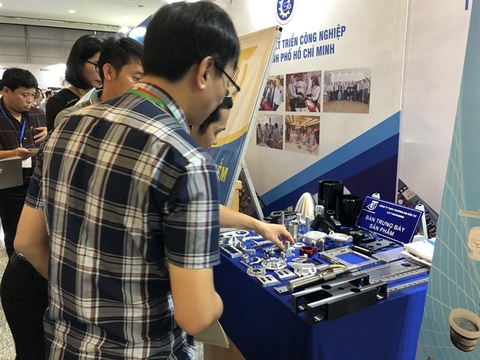
Supporting industry products on display at a fair in HCM City. The city’s investment stimulus programme for supporting industries has greatly helped them acquire new production technologies and become suppliers to many large global companies. — VNS Photo
In nearly two years since it began, HCM City’s investment stimulus programme for the supporting industries has enabled a number of businesses to acquire new technologies and equipment, upgrade their factories and enter the supply chains of global large corporations, according to the Centre for Supporting Industry Development (CSID).
Trinh Mai Hung, deputy director of the CSID, said the programme for 2018-20 sought to help local companies invest in new technologies and equipment to make products that satisfy the requirements of manufacturing enterprises and take more supporting industrial products into global supply chains.
Under the programme, the city fully subsidises loan interest for eligible businesses.
So far 24 projects with a total investment of nearly VND1.8 trillion (US$77.4 million) have received loans of VND1 trillion for up to seven years.
“The investment stimulus policy has created conditions for enterprises to boldly invest in renovating machinery and equipment to participate in the supply chains of foreign corporations in Viet Nam. Enterprises have risen to become tier- 1, 2 and 3 suppliers.”
The programme has significantly increased investment in priority sectors such as mechanical engineering, chemicals, plastic, rubber, food and foodstuffs, electronics, IT, textiles, and footwear.
In the last two years the city Department of Industry and Trade has directed the CSID to apprise businesses directly and indirectly about policies.
Businesses have numerous benefits from the programme, but also some difficulties in terms of conditions for participating.
To participate in it, a business must have a new factory and machinery and equipment and must get a loan from a bank. The latter is the most important condition, but most supporting industry businesses are small or medium-sized and lack collateral, and so find it hard to obtain loans.
Many also complain about the programme’s time-consuming procedures, which causes them to lose market opportunities and makes them reluctant to participate.
Hung said his centre has suggested measures to the city government to boost the development of supporting industries.
They include allotting land to them, building high-tech industrial clusters and providing more support for industrial development and to innovative start-ups, he said.
At the same time the city regularly organises a programme to connect businesses with banks to ensure credit, develop key products, carry out trade promotion and other activities to promote exports and support businesses in the field to expand their market share in and outside the country. — VNS